
Plane and simple
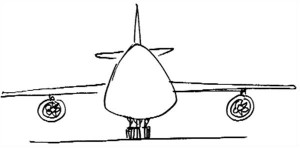
Sir,
I am surprised and shocked at the manner in which the US media is sensationalizing a human tragedy involving lives of 239 souls. Any accident where an aircraft is not located for such a long time can definitely be declared missing with a 99.9% surety that a fatal crash has occurred with no survivors. The cause of crash could either be an unauthorized illegal entry of a terrorist into the cockpit, or an aircraft multi-system failure.
What the media has innocently, or intentionally, not disclosed as to what led to failure of Emergency Locator, installed on the B777, which is required to transmit its geographical location through a satellite in case of a crash in the sea, to help recover the aircraft or its debris, and a lack of possible backup systems.
Every aircraft in the post 9-11 era is fitted with enforced cockpit entry doors that can only be opened through a digital code pressed by authorized cabin crew, with pilots having the final authority to either open the door or keep it closed.
It is the responsibility of the airline operator or the state regulatory authority to enforce strict discipline by giving exemplary punishments such as dismissal/license cancellation if the door is left open, or an unauthorized person is allowed entry into a cockpit. Airlines are required to carry out routine periodic psychiatric evaluations, medical fitness and proficiency checks of pilots, which the MAS must be doing. Discipline can only be ensured if recruitments in airlines are strictly on merit in all cadres, which unfortunately stands compromised in Southeast Asia because of political appointments of cronies to top management positions.
The media must give time to the investigators to focus on the tasks assigned to them, instead of indulging in speculation and adding to the woes of next of the families and friends of the unfortunate passengers.
Tariq Ali,
New York.
Gaza gamble
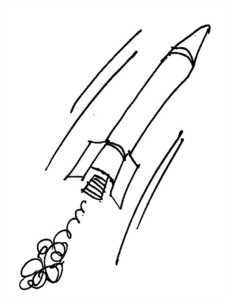
Sir,
Hamas, the longtime frontrunner in the internal jockeying of organizations fighting Israel, is in its struggling days, while the Palestinian Islamic Jihad (PIJ) is gaining strength day by day. In recent years, Hamas had a calming effect on the populace, but as the Gaza economy fails and Hamas struggles to find funding, more radical elements are gaining support. The PIJ is receiving financial support from Iran and has adopted a militant stance towards peace and disarmament. The United Nations is facing a $65 million deficit in its food relief mission in Palestine, making cuts to food relief imminent. With UN food shipments drying up, the PIJ can offer food in exchange for military service and bolster its number of active combatants.
The Islamic Jihad is behaving more militantly with each passing day which is of course creating problems for Hamas, which controls Gaza. One day, after the Israeli Defence Forces killed three PIJ militants while they were firing a mortar right next to the border fence, Islamic Jihad fired some 60 rockets at Israel, which responded by attacking dozens of targets in the Gaza Strip. The PIJ has succeeded in dragging Hamas into an adventure that it hardly wants, and at the worst possible time.
But what is actually stopping Hamas, a group that even Israel recognizes as the sovereign authority in the Gaza Strip, from disarming the Al Quds Brigade, the military wing of PIJ? Who or what is preventing fighters from the Al Qassam Brigade, whose military strength is several orders of magnitude greater than Islamic Jihad’s, from enforcing their authority?
Perhaps it is the increased support of Iran for the PIJ. Shortly after Hamas seized control of the Gaza Strip in July 2007 and expelled the Fatah leadership, the Al Qassam Brigade launched an extensive military operation to disarm the other organizations operating there. Iran commended the PIJ on the rocket attacks that struck deep into Israel in recent days which is unsurprising because the rockets were most likely from a shipment supplied by Iran. Israel intercepted an Iranian shipment of rockets earlier this month bound for Gaza.
It’s not that Hamas has not ever enjoyed Iranian patronage. The generous aid and strong backing, which provided Hamas’s leaders with a considerable (and sometimes exaggerated) sense of security, was suddenly cut off when Hamas decided to side with the rebels in the Syrian civil war. In just a short time, Hamas lost all of its supporters, including Iran and Syria, and became an enemy of the new Egyptian regime.
Now Hamas would rather not exacerbate the rift with Iran by attacking the Islamic Jihad. The leaders of Hamas are caught between a rock and a hard place. On one side they have Israel, which threatens them with a large scale military attack if the rocket fire doesn’t stop. On the other side is Iran, which will not stand silently by if Hamas causes any harm to the members of Islamic Jihad or to Iranian interests in Gaza.
Hamas opted to absorb a single Israeli military assault in Gaza, which would be over in a few days, rather than confronting PIJ or its sponsor Iran.
Manish Rai,
New Delhi.
Technology vs terror
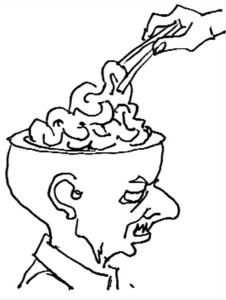
Sir,
Pakistan is a country full of hardliners propagating their own brand of Islam through force and coercion. These groups leave no stone unturned in forcefully baptizing people, and those who resist are killed brutally.
It is an irony of fate that people are insecure even in mosques and churches, fearing suicide attacks. The groups that carry out these attacks claim to be flag bearers of Islam, although their actions have nothing to do with the true spirit of Islam.
Pakistan can use modern technology to overcome this violence. Our National Database Registration Authority has touched many milestones in the recent past and continues to move ahead. One way to do this would be to include DNA information of every citizen in the national identity card database.
DNA, or deoxyribonucleic acid, is a self-replicating material present in nearly all living organisms as the main constituent of chromosomes. It is the carrier of genetic information. It helps in tracing people in the shortest possible time. DNA information can be obtained even from a single hair, or a drop of saliva. A DNA test could make checking DNA from people arrested for crimes with DNA samples from crime scenes stored in forensic databases almost as easy as matching fingerprints.
Forensic relics and remains are often found on crime scenes, especially on suicide attack scenes, and can easily be matched. Hence, criminals can be identified by comparing the DNA sample obtained from the scene with NADRA’s database. It would help in checking, controlling and curbing such crimes.
Iftikhar Mirza,
Islamabad,
Head in the sand - I
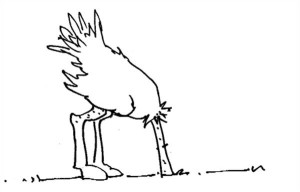
Sir,
People residing in the deserts of Thar have countered the menace of drought time and again. Hundreds of men, women and children have lost their valuable lives. Yet again, this menace has taken a heavy toll on lives of the oppressed residents of the area, particularly the children. Pakistan’s media has reported, quoting information disseminated by the Mitthi Taluka Hospital (MTH), that over 100 children have so far become unfortunate victims of disease and malnutrition in a short span of just three months. However, the figures revealed by those in positions of authority are roughly half the number given by the MTH. Unfortunately, as reported in the media, 32 children died due to severe malnutrition in the month of February alone. According to figures furnished by the MTH, more or less 38 children admitted in the hospital had died in December 2013. Forty two lost their lives in January 2014, and 36 and 5 deaths occurred in February and March 2014 respectively.
The district of Tharparkar has four other talukas, with over 2,000 villages spread across the largest desert region in the country. Effects of drought in most of these areas are not precisely known, which is shocking indeed. The scenario depicted above is not only distressing but also pitiful. It compels one to think as if the drought-stricken region of district Tharparkar is not a part of the country’s southern province of Sindh. At least that is what the attitude of those at the helm of affairs in the province is towards this region and its people. The callousness and insensitivity of the administration particularly towards the less developed areas of the country and its people have been the hallmark of successive governments in the country.
M Fazal Elahi,
Islamabad.
Head in the sand - II
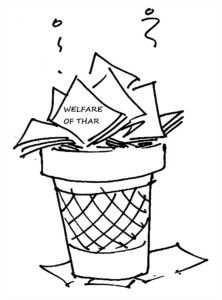
Sir,
The Sindh government spent billions of rupees on a cultural festival, but couldn’t spend any on the welfare of the people of the province. Poor governance is the main reason behind the famine in Thar.
Unofficial reports reveal that more than 200 children have died because of disease or malnutrition so far. The primary cause of both is a shortage of medicines and essentials. Many of them have lost their cattle, on which they depend for their livelihood. But the federal and provincial governments are playing games with them.
A government’s priority should be the welfare of its citizens – in this case, the provision of basic necessities like food and shelter – and not recreational activities in the time of a calamity. The recent Sindh and Punjab festivals were extravagance.
Ayaz Amjad,
Islamabad.
Detribalization
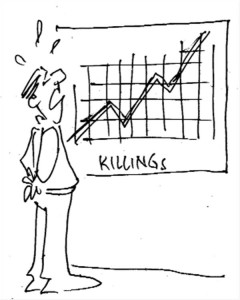
Sir,
I have been a regular reader of your magazine for the last 20 years and enjoy most of the articles that appear in it. For many years, the most talked about issue in your magazine has been the rise of the Taliban and the threat they pose to the civilian population of this country in general and the people of Khyber Pakhtunkhwa in particular.
Thousands of innocent people have been massacred and thousands of others have been disabled because of bomb blasts, which have been a routine occurrence in this part of the country. Besides, kidnapping and harassment have also become a daily occurrence.
I think that the solution of this menace lies in a bold and multi-pronged initiative to be taken by the federal government. One of the key solutions lies in the change of the status of FATA. The current status of FATA is a continuation from the colonial times when the British were the masters of the subcontinent. Pakistan became independent in 1947, but so far no measures have been taken to change the governance rules in the tribal areas.
During the last PPP tenure, some cosmetic steps were taken to extend political activities to FATA, but they have remained largely ineffective. I think the best way to bring about a radical change in the lives of the people of the tribal areas is to merge them with the province of Khyber Pakhtunkhwa and make it mandatory that the governor of the province is from FATA.
FATA could also become PATA, so that they continue to enjoy such amenities as exemption from all types of taxes. It could get representation in the provincial assembly instead of the Senate. This measure will be opposed by the senators or MNAs of FATA on one hand and the politicians of Punjab on the other, but it is the only viable, practical and effective option available.
This step would enable the people of FATA to gradually merge into the mainstream of Pakistan, including access to justice under Pakistani courts and police, new employment opportunities, de-weaponization.
These measures must also be accompanied by a resolve to forcibly tackle the foreign mercenaries residing in the tribal areas under the protection of the Taliban.
Jawaid Iqbal Khalil,
Peshawar.
TV tropes

Sir,
The Pakistani government is entering into the second phase of negotiations with the TTP. A new committee, consisting of bureaucrats, indicates the PML-N’s conservative approach towards the peace talks. The dialogue is amongst the favorite topics of Pakistani media.
With the emergence of electronic media in Pakistan a decade ago, it was anticipated that the common man would be able to comprehend sociopolitical realities in a much better way. It seems now that it was an error of judgment – a very simplistic expectation.
The question is, what made the media change its early anti-establishment stance to a more right leaning pro-establishment one as seen in the recent times? The answer lies with media itself. Television talk shows have played to the gallery instead of educating the masses on the ideological clashes that weaken the Pakistani state. Acting out of their own commercial interests, TV channels have never encouraged serious debate based on ideological analysis and scholarly research. Instead, they have created an emotionally charged environment with superficial debates that have no intellectual value.
And that is why the media is now dancing to the tune of the rapidly radicalizing Pakistani society. Ten years ago, the media had an initiative on its hands and was in a situation that it could take the decisive role in setting the intellectual course in Pakistan. The same media anchors who would openly flog conservatives a few years ago now use faith studded language in their shows.
The electronic media has lost a great opportunity to take control of the national discourse. Instead, it has become hostage to its own commercial interests and has effectively surrendered to the strengthening right-wing forces.
Atif Mahmood Majoka,
Melbourne.

